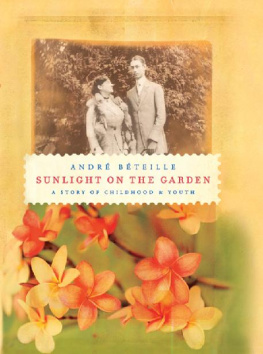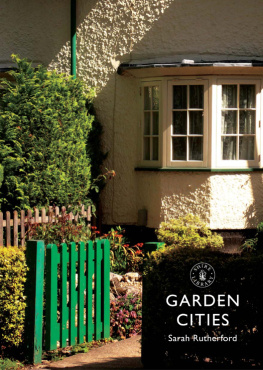ANDR BTEILLE
Sunlight on the Garden
Contents
To the memory of
Shibani Mukherji,
my maternal grandmother
whom we all knew as
Dida
The sunlight on the garden
Hardens and grows cold.
We cannot cage the minute
Within its net of gold,
When all is told
We cannot beg for pardon.
Louis MacNeice
My Two Grandmothers
Like most children, I had two grandmothers, but none of the children I knew had two who were as unlike as mine in background, association and temperament. My two grandmothers were both widows in straitened circumstances, and they both lived in the same small town where I grew up. But their social worlds were far apart, and I have no recollection that they ever met. Their differences were in any case very large; what made it impossible for them to meet was of course the marriage of my parents which had overturned the worlds of both. From the social point of view, that marriage was a recipe for disasterall the more since neither of my parents belonged to the kind of affluent and cosmopolitan world in which their match might have been considered just a little risqu, and to that extent fashionable. In my adult life I have had many encounters with that world but have not found it more appealing than the ones I will now describe.
My paternal grandmother lived in an old, colonial-style house on the strand facing the river.
She had come down in the world, or so she believed, and made my father, her only child, believe. She was still beautiful when I knew her as a child. Her parents had come out from France as indigo planters, and they settled in Chandannagar where she was born. I doubt that they made much money, and she married an official with the designation of trsorier, which would correspond roughly with collector in English, who had come out from France in the colonial service. Shortly after my father was born and just a few years after her marriage, her husband died, a victim of cholera, a disease which must have carried away many Europeans who came to seek their fortunes in the colonies.
Thus, while still in her twenties, my grandmother, known to everyone in our town as Madame Bteille or simply Madame, became a widow with a small son and hardly any means of support. The local French community came to her aid and established a small school with the grand title of cole de jeunes filles , and placed it in her charge. There she taught and lived, for the school had only three or four classrooms, the rest of the building being used as her apartment.
She devoted the early years of her widowhood to the raising of her only son around whom she must have woven many dreams. Her resources were meagre, and she had to strain herself to maintain good relations with the few families of French notables in the town: the administrator, the judicial magistrate and the police commissioner. When I knew her, the strain was obvious even to the eyes of a child, for, by then, her only son had shamed her by marrying a native woman.
The French officials who came and went may have stood a little in awe of her for she had a majestic presence, but on the whole, they treated her kindly. However, she had an enemy in the parish priest, also a Frenchman, Father Durier, after whom I was named Andr Marie. He was by all accounts a most remarkable man, and for some reason he took a great liking to my mother and so became my grandmothers enemy. I never saw Father Durier, but my mother was devoted to his memory. She was an anarchist at heart, and her heroes were people who tilted at windmills. She would recount with great relish how Father Durier had told off the administrator, the magistrate and the police commissioner. My mother believed he could do this because, unlike the others, he was learned, and upright. She had great faith in learning and in rectitude and believed, rather innocently, that the two went together. When in later life I would point by name to the many learned people I knew who were petty schemers, she would reply doggedly that they could not be really learned. She herself was not learned, and I wondered what she would have thought if she had been.
Father Durier berated my grandmother about her hardness of heart towards my mother. Madame Bteille heard him out patiently and courteously as became a good French Catholic woman, but did not yield a millimetre. She did not have to put up with Father Durier for the rest of her life. He was replaced by Father Daniel, a tall and gaunt man with watery blue eyes who was the first parish priest I can recall. He was a Frenchman of a very different stripe from his predecessor, and for him, as for many others of his calling, race came before religion. He was condescending towards my mother, and my grandmother had no difficulty in establishing easy relations with the new director of her soul. My mother may have prejudiced me against him, but I still remember with distaste the patronizing manner in which he would pat me on the head when I greeted him on the street as I was instructed by my father to do.
My grandmothers house had a small clock tower adjacent to it, which was one of the landmarks of the town. The clock tower had an inscription recording the name of the person who had made the benefaction; he was my grandmothers paternal uncle or her grandfather, I cannot recall which. The name, Domain de St Pourain, was a source of some strife between my parents. My father believed, although he did not assert his belief too strongly, that his mothers ancestors were squires of some sort as was indicated by the name on the clock tower. My mother hotly repudiated this, for she had found out from Father Durier that the Domains were common people who had merely come from St Pourain, and assumed aristocratic pretensions in the colonies. True or false, my grandmother was quite capable of imposing upon the petty officials who came out to the colonies on short spells of service.
My grandmothers house on the strand was a somewhat mysterious place for us in our childhood. We passed it almost every day, in the evenings, and sometimes also in the early mornings, during our rambles along the strand and down the bank to the edge of the river, but we did not have free access to it. I wonder now what would have happened if we just wandered in and presented ourselves as her grandchildren. My mothers fierce pride stood in the way for she did not want us to go where she thought we would not be welcome. There was an additional impediment which might have been the more important one in my case. Till I was nine, I hardly spoke any language other than Bengali, and I worried about what I would do if she addressed me in French or English. Perhaps my peculiar childhood has made me unusually sensitive to the processes of social exclusion, and keeping my distance has become a part of my nature with somewhat mixed consequences for my career as a sociologist.
In the arrangement of her household, my grandmother maintained the lifestyle of a French gentlewoman living under adverse conditions in an alien land. I am certain that in her circumstances, she would have found living in France even more difficult. She did in fact return with her infant son shortly after losing her husband, but found little help from the people on whom she thought she could depend. She had cut her roots from France, and there was no going back to the land of her ancestors.


















